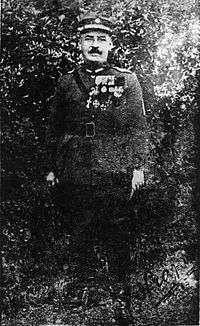Vlasios Tsirogiannis
Vlasios Tsirogiannis (Greek: Βλάσιος Τσιρογιάννης, 1872–1928) was a Hellenic Army officer who rose to the rank of Lieutenant General.
Vlasios Tsirogiannis | |
|---|---|
 Tsirogiannis in the 1920s | |
| Born | 1 January 1872[1] Karvasaras |
| Died | 5 November 1928 Thessaloniki |
| Allegiance | |
| Service/ | Hellenic Army |
| Years of service | 1889–1928 |
| Rank | |
| Wars | Greco-Turkish War of 1897, Macedonian Struggle, Balkan Wars, World War I, Asia Minor Campaign |
Life
Vlasios Tsirogiannis was born on 1 January 1872 in Karvasaras (modern Amfilochia). He enlisted in the Hellenic Army as a volunteer on 1 September 1889, and became an NCO. While a student at the NCO School, he participated in the Greco-Turkish War of 1897. On 9 August 1899 he graduated from the NCO School as an Infantry 2nd Lieutenant.[2] In 1904, during the early stages of the Macedonian Struggle, he went to Strumica as the headmaster of a Greek school, with the cover name of Dalis (Ντάλης).
During the Balkan Wars of 1912–13 he served as company and battalion commander in the 10th Infantry Regiment.[2] In 1917–18 he served as commander of the 5th Infantry Regiment at the Serres sector of the Macedonian front. In 1919 he commanded a brigade that recaptured the region of Delvinaki, and later assumed command of a brigade that was intended for the aborted capture of Korytsa.[2] He then went to Asia Minor, where he commanded a detachment of the 9th Infantry Division in the capture of Kütahya (July 1921), and then served as the division's Chief of Infantry in the Battle of Sakarya (August–September 1921). He was then placed in suspended service, before being recalled after the 11 September 1922 Revolution and placed as commander of the 3rd Infantry Division in the Army of the Evros.[2]
He then served as commanding officer of the 2nd Infantry Division at Athens, before assuming army corps commands; he died on 5 November 1928, while a Lt. General and commander of III Army Corps at Thessaloniki.[2]
References
- Note: Greece officially adopted the Gregorian calendar on 16 February 1923 (which became 1 March). All dates prior to that, unless specifically denoted, are Old Style.
- Μεγάλη Στρατιωτική και Ναυτική Εγκυκλοπαιδεία. Τόμος Στ′: Σαράντα Εκκλησίαι – Ώχρα [Great Military and Naval Encyclopedia. Volume VI]. Athens. 1930. p. 414.